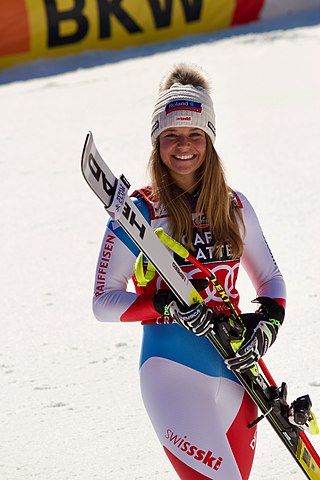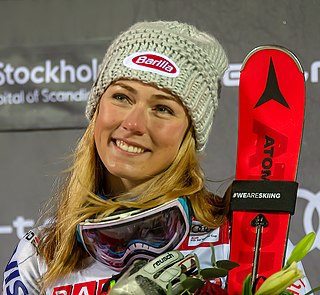
The FIS Alpine Ski World Cup is the top international circuit of alpine skiing competitions, launched in 1966 by a group of ski racing friends and experts which included French journalist Serge Lang and the alpine ski team directors from France and the USA. It was soon backed by International Ski Federation president Marc Hodler during the FIS Alpine World Ski Championships 1966 at Portillo, Chile, and became an official FIS event in the spring of 1967 after the FIS Congress at Beirut, Lebanon.

The International Ski Federation (FIS) Alpine Ski World Cup, the premier circuit for alpine skiing competition, began in January 1967, and the 2019–20 season marked the 54th consecutive year for the FIS World Cup. As it had every year since 2006, the season began in Sölden, Austria in October. The season was supposed to end with the World Cup finals in March, which were to be held in Cortina d'Ampezzo, Italy for the first time since they began in 1993, but the finals were cancelled due to the COVID-19 outbreak in Italy.

The women's downhill in the 2021 FIS Alpine Skiing World Cup consisted of seven events. The original schedule had called for eight downhills, but the World Cup finals race was canceled.

The women's overall in the 2021 FIS Alpine Skiing World Cup involved 31 events in 5 disciplines: downhill (DH), Super-G (SG), giant slalom (GS), slalom (SL), and parallel (PAR). The sixth discipline, Alpine combined (AC), had all three of its events in the 2020–21 season cancelled, The tentative women's season schedule included 37 events, but the final women's schedule cut the number of events to 34 due to the continuing disruption cased by the COVID-19 pandemic. Among the changes were the elimination of the three Alpine combined races to eliminate the mixing of speed skiers and technical skiers in those events, as well as the elimination of two of the three parallels in favor of other races. Ultimately, only three of the races in this schedule -- one downhill, one Super-G, and one giant slalom -- were canceled during the season, as discussed later.

The men's downhill in the 2020 FIS Alpine Skiing World Cup consisted of nine events, with only one cancellation from the scheduled ten.

The men's giant slalom in the 2020 FIS Alpine Skiing World Cup involved seven events, as the last two scheduled giant slaloms in the season were cancelled.

The men's slalom in the 2020 FIS Alpine Ski World Cup involved only nine events, as the final three scheduled slaloms of the season were cancelled.

The Men's combined in the 2020 FIS Alpine Skiing World Cup involved 3 events, all of which were completed before the season was halted due to the COVID-19 pandemic. A major change was made in the discipline this season due to the recent dominance of slalom specialists in the combined over speed racers. As was previously the case, the first run continued to be the speed discipline. The second run then started in reverse order of finish in the speed run, which allowed the slalom specialists to tackle fresh snow as the first down the hill in the slalom run, while the speed specialists had to face the more challenging rutted snow at the end of the day, as the last skiers of the 30 who qualified for the second run. Instead, the second run was changed to start in the same order as the finish of the speed run, so that the leader after the speed run became the first to race on the fresh slalom course.

The men's parallel competition in the 2020 FIS Alpine Skiing World Cup was contested as a World Cup discipline separate from slalom for the first time in 2020. Prior to the season, FIS decided to combine parallel skiing events into a new discipline, joining the existing disciplines of downhill, Super-G, giant slalom, slalom, and combined. The discipline winner would receive a small crystal globe, similar to the other disciplines. However, at the same time, FIS decided to drop the city events to reduce the amount of travel required during the World Cup season, planning to replace them with more parallel events at regular venues.

The men's overall in the 2020 FIS Alpine Skiing World Cup consisted of 36 events in 6 disciplines: downhill (DH), Super-G (SG), giant slalom (GS), slalom (SL), Alpine combined (AC), and parallel (PAR). The season was originally scheduled to have 44 men's races plus a mixed team event, but a race in Japan plus final the seven men's races and the mixed team event were all cancelled, as discussed below.

The women's downhill in the 2020 FIS Alpine Skiing World Cup involved 8 events, with only one canceled.

The women's giant slalom in the 2020 FIS Alpine Skiing World Cup involved 6 events. The season had been scheduled for nine events, but all of the last three giant slaloms were canceled.

The women's slalom in the 2020 Alpine Skiing World Cup involved 6 events, although there were 9 originally scheduled.

The Women's Combined in the 2020 Alpine Skiing World Cup involved two events, although four had been scheduled. A combined at Val d'Isère, France on 22 December 2019 was cancelled due to heavy snowfall, which forced the downhill scheduled for the day before to be shifted back a day, and a combined at La Thuile, Italy on 1 March was also cancelled due to heavy snowfall the challenge in rescheduling during the COVID-19 pandemic.

The women's overall in the 2020 FIS Alpine Skiing World Cup involved 30 events in 6 disciplines: downhill (DH), Super-G (SG), giant slalom (GS), slalom (SL), Alpine combined (AC), and parallel (PAR). This was the first year that parallel was treated as a separate discipline; prior to the 2019–20 season, it had been a sub-element of the slalom discipline. The season had originally been scheduled to have 41 races, but 11 races that had originally been scheduled were canceled during the season, mostly due to the COVID-19 pandemic, as discussed below.

The women's slalom in the 2022 FIS Alpine Skiing World Cup consisted of 9 events, including the final.

The women's downhill in the 2023 FIS Alpine Skiing World Cup consisted of nine events, including the final. The original schedule called for eleven events, but the first two races of the season scheduled for 5 and 6 November 2022 in Zermatt/Cervinia, were canceled due to adverse weather conditions; the FIS decided not to reschedule them. Once the season began, a downhill scheduled in St. Anton on 14 January had to be converted into a Super-G due to the inability to hold a pre-race training run on either of the two days prior to the downhill. However, a subsequent Super-G scheduled at Cortina d'Ampezzo was converted into a downhill, restoring the original schedule.

The women's super-G in the 2019 FIS Alpine Skiing World Cup involved 6 events, including the finals in Soldeu, Andorra. Originally, the season had been planned to hold 8 events, but the two races scheduled in Sochi, Russia were cancelled due to continuing heavy snowfall.

The women's slalom in the 2019 FIS Alpine Skiing World Cup involved 12 events, including three parallel slaloms. At the end of the season, a new discipline was created for parallel races.

The Men's combined competition in the 2016 FIS Alpine Skiing World Cup involved three events that combined a one-run speed race with a one-run slalom. Under the rules in effect at the time, three races in the discipline were required to award a crystal globe to the discipline champion. The declining popularity of combined skiing led the three combined races scheduled for 2016 to be run under three different formats. The first race, at Wengen, was run as a traditional super-combined ; the second race, at Kitzbühel, was run as a traditional Alpine combined ; and the third race, at Chamonix, was run as an inverted super-combined.












